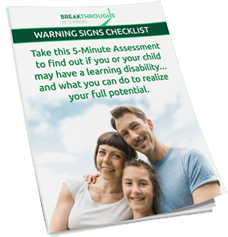
Does it affect life at home, at school or at work?
Take 5 minutes to complete the Warning Signs Checklist and discover whether you or your child could have learning difficulties that are impacting your life, and what to do about it.
Take The Free Warning Signs Checklist!
Short Term Memory is the gate through which all of our experiences filter. Many children struggling at school have poor short term memory which leaves them unsure of what the instructions were for the assignment they’re staring at and unable to start. Imagine training a new employee with poor short term memory! As much information as you pour into them, most of that information is leaking out.
Below is a diagram of how our short term memory system functions. Information enters our brain from one of our senses, and dumps it into our short term memory. In this case we’ll use verbal instructions as an example. Mom asks Jimmy to complete several chores while she is busy getting dinner ready. In this scenario Jimmy has a weak short term memory and some of Mom’s instructions are going to leak out of his short term memory. This will occur regardless of effort or focus. As time passes and Jimmy begins to work on the chores he DOES remember, whatever contents remain in his short term memory will transfer into his long term auditory memory storage tank.

Unfortunately, even if Jimmy has excellent long term auditory memory, his ability to use it is limited by how much information has ‘leaked’ while it was in his short term memory. In this way, short term memory can cripple someone who has many areas of strength but is unable to use them to their fullest potential. Short term memory has many different symptoms and is often the missing link for those struggling to learn. Parents are often torn between two pictures of their child. The bright capable, happy and trying to please child, vs. the slow, disobedient, rebellious, incapable of learning simple tasks child. Many of the children we work with at Breakthroughs have above average intelligence, but are unable to express it in the way that society expects, and so they are labeled.
Short term memory problems lead to a host of symptoms which often leads to labels. Lazy, rebellious, disobedient, careless and more are all often merely symptoms of poor short term memory. It’s difficult to follow through on what you were asked to do if you can’t remember, or worse yet, don’t even remember you were asked to do anything at all!
These problems cover a wide range, from the fully functioning adult who occasionally forgets things to someone who has rolling anterograde amnesia. A pop culture reference to someone suffering horrendous short term memory loss is found in Pixar’s Finding Nemo character, Dori.
Hopefully the challenges you or your child are facing are not nearly that serious. Do your friends or co-workers joke that your best friends are your post-it-notes? Often adults complain of losing their keys, not remembering where they parked, forgetting to follow through on a request by a spouse or friend. As you can see, short term memory significantly impacts social interactions.

Here you can see an fMRI brain scan, from research done by Dr. Richard Clark at Flinders University. The highlighted areas of the brain responsible are for short term memory. As you can see, one of the major centers responsible for short term memory is located at the back of the brain, making it particularly susceptible to damage from a concussion. As the brain bounces off the skull tissue, it is compressed and damaged. Even if the victim doesn’t black out, significant damage can occur.
The good news? Every day at Breakthroughs we work with children from age 4 right through to senior citizens who are facing the same struggles and seeing real results. Our assessment process discovers the root causes of the challenges you are facing and your Individualized Brain Development Program is specifically designed to address your needs and develop your areas of weakness. Poor short term memory affects every area of life, often leading to high levels of anxiety and numerous other challenges. If you or your child struggle with poor short term memory, don’t wait. Get help. Doing nothing will not create any change.
Subscribe to our newsletter and receive regular articles and resources to help you or your child perform better at school, home or work.
suscribe now
Post Your Comment Below